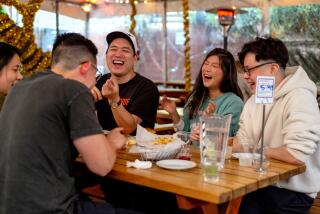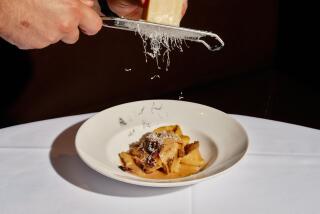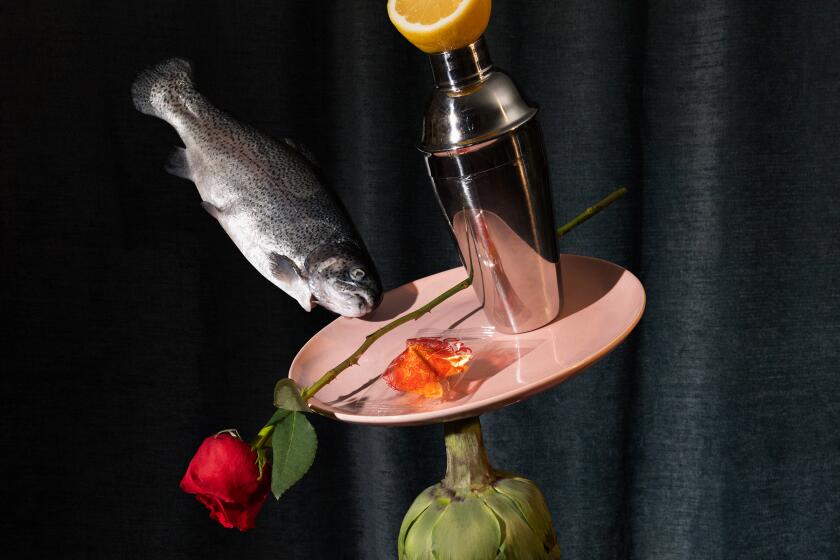He’s Possessed With the Apostrophe
Apostrophes are useful gizmos, but you have to know how to use them.
My wife and I just returned from a couple of weeks in New England. This year, we missed the full dose of the spectacular autumn foliage, but the scenery was, as usual, beautiful, and I saw a restaurant called Athen’s Pizza. A strange name, I thought. I’d never heard of, anyone named Athen, so I figured that the pizzeria’s owner was probably a Greek who liked pizza and who thought Athens, the English spelling of the Greek Athenai , was incomplete without an apostrophe. I should have gone in and asked about the name Athen’s.
I phoned New Hampshire information after we got home. I got the number and called the pizzeria from Los Angeles. I asked if, in addition to pizzas, they served Greek food. The guy said they serve a couple of Greek dishes. I asked if the place was named after Athens, Greece, or Athens, Ga., The guy said Athens, Greece. I didn’t ask about the apostrophe.
Apostrophes shouldn’t be as perplexing as they obviously are. It’s easy enough to understand why some people think the possessive its should be spelled it’s. An apostrophe is often a sign of possession; but, like its relatives ours, theirs, and yours, its is an apostropheless possessive.
It’s, with the apostrophe, is a contraction--two words contracted into one; the apostrophe takes the place of the missing i from it is, as in “It’s a good thing,” or of the ha , from it has, as in “It’s been a rough day.”
The apostrophe stands for something that is missing, or was missing at some time in the language’s development. Centuries ago, a phrase like “John his house” became “John’s house.” The apostrophe stood in for the hi in his. From that came the use of ‘s as a possessive for either gender as well as for genderless things: Jacob’s ladder; mother’s milk; the car’s headlights.
The apostrophe has stood in for u , as in let’s for “let us”, and even for “God” in the obsolete oath “God’s wounds,” which, to avoid blasphemy, was cut to ‘swounds and later to zounds, which has been so completely severed from its roots that it no longer rhymes with wounds. Zounds is not much used nowadays, but when it is, it’s pronounced zowndz .
Athen’s Pizza reminded me of my all-time favorite encounter with an inappropriate apostrophe. About 12 or 13 years ago, my wife and I were up in the logging country not far from Redding. We had spent the night in a small town--the name has since faded. We were having breakfast in a cafe that had damp laminated table tops, which depressed the appetite.
A short stack of the local newspaper sat next to the cash register, and I’d bought a copy. It was one of those typical small-town weeklies that specialize in local gossip and the high school basketball scores. Those homespun papers inevitably make people like me foolishly nostalgic for a small-town life.
My thoughts were dwelling on the notion of selling our house and buying a little place out there in the uncluttered country, with clean air, open spaces and an unpretentious weekly news sheet. In this frame of mind, I came across a personal ad that said, “Wanted: snow plow for Willy’s Jeep . . . ,” and then it gave a phone number. In my mind’s eye, I saw Willy, a good-natured youngster with a smile and a helping hand for his neighbors. I was sure that in a town like this, where everyone knows everyone else, Willy would have that snow plow for his Jeep in no time.
It was probably a full minute before I drifted back to reality and realized I’d been suckered by a malapropos apostrophe. Willy vanished, replaced by a rather mean-spirited geezer who happened to own a Willys.
It’s just as well. At least we didn’t sell the house.
More to Read
Eat your way across L.A.
Get our weekly Tasting Notes newsletter for reviews, news and more.
You may occasionally receive promotional content from the Los Angeles Times.






